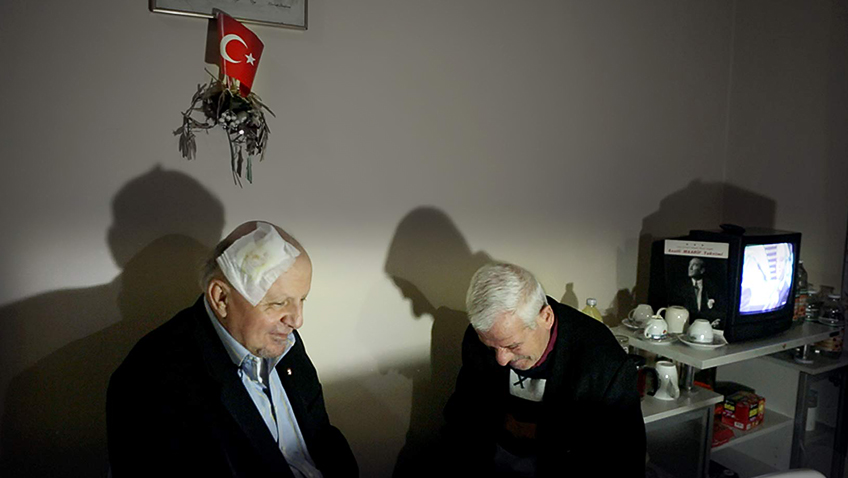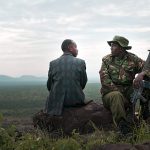Joyce Glasser reviews Distant Constellation (August 17, 2018) 80 min. ICA Cinema London
While Turkish-American filmmaker Shevaun Mizrahi is capturing the fading lives of residents of a care home in Istanbul and dropping in on the construction workers building their lives – and a huge structure – next door, we are reminded of how small our world has become. The home is apparently for cultural minorities and the residents speak several languages, including French and English.
 One construction worker advises a 22-year-old to get a skill so he can earn more and work abroad.
One construction worker advises a 22-year-old to get a skill so he can earn more and work abroad.
While the home is in a neighbourhood where Mizrahi’s father grew up, she was fortunate enough to learn her craft as an assistant to the great American cinematographer Ed Lachman, best known for Erin Brockovich, I’m Not There, Far from Heaven and Carol. Mizrahi was inspired by her time working with Lachman on Austrian Director Ulrich Seidl’s ‘Paradise’ trilogy (Paradise: Love, Paradise: Faith and Paradise: Hope) although seldom are Seidl’s feelings for his fictional characters so compassionate.
The construction workers’ dormitory is a bleak, depressing place, but the exhausted men who collapse into their single beds and are awakened before dawn do not have time to look around. Dawning hard hats and yellow vests they march up a hill for breakfast and then for the building site. The residents of the care home where Mizrahi started volunteering in 2009, taking her camera with her, are up very early, too, but their sleep is not as sound as those of the young men toiling in the bitter cold outside their windows.
Mizrahi credits the participants in her film at the end, but while they are speaking we do not know their names and only that information that the speakers which to share. But we come to identify the photographer who is going blind and repeats phrases over and over. He is looking forward to his birthday in ten days and checks a calendar with his magnifying glass to verify the date. Time runs on and it’s easy to lose track of it in the routine of the care home – or on the construction site.
As the photographer struggles to fix a flash and to see through the lens of his camera, Mizrahi’s camera darts to a framed photo of a dashing photographer with a thick head of black wavy hair and a stylish raincoat . His older self cannot let go of his camera, even though he can no longer use it. ‘I’m not a diabetic. I’m in good shape. I have a big camera,’ he claims. ‘We’ll have good photos,’ he says before inviting the director to the party and staring at the cranes out the window.
While the photographer is struggling to keep on top of the time and date, Selma (not her real name) struggles to keep awake long enough to tell her harrowing story. In an intense close up we meet a hunched-over, white-haired woman who tells us in perfect English that her family were well off before WWI. ‘We had a cow and a donkey… and my grandfather had a mill where he made the best flour in the area, but they burnt it.’ Surely she was too young to recall how they separated the men and shot and strangled them before burning the villages. The women had to convert to survive. ‘For a while we had Turkish names’, she says, pronouncing each one, like a dagger to the heart.
Then Selma begins to talk about marriage, a subject that later comes up when the 22-year-old construction worker, whose only experience was working in the fields, announces he is getting married in the makeshift canteen at breakfast.
Selma tells us that ‘we never thought about marriage’ because life was too chaotic during and after the Armenian genocide. She then tells a heart wrenching story of how, during WWII she cared for, and bonded with, a young girl named Diana, but after two years, the mother gave the job to someone else. When Selma pauses, she dozes off as the camera rolls, making us feel uncomfortable at this intrusion. When she awakens a couple of minutes later she touchingly blinks at the camera: ‘I fell asleep, didn’t I? I’m sorry.’ She asks Mizrahi (the one-person crew whom we never see, but whose presence we feel) not to use her real name because she is afraid, and suggests the name Selma. This woman has lived her entire life with the trauma of the still unacknowledged Armenian genocide.
Two men (apparently brothers) are in a lift discussing a dying man’s daughter who told the home that she was too busy to come, and one reflects that his daughter called, but his son has not. ‘That’s life’. Then we realise that the men are not going to their floor, but are passing the time riding the lift. Three women try to enter and the last doesn’t make it, accepting that ‘it’s only for people’ as she retires with her walker.
The film is not without this type of inadvertent humour, although the emotions are generated by the participants and not by the director. Later when we see the two men from the lift, one has had an injury. ‘I will pray for you’, his brother says. ‘No need for that,’ the injured man replies. ‘God is on top of it.’
The most colourful character has to be an accomplished pianist and ladies’ men who we first meet when he is giving a surprising summary of Nabokov’s Lolita. He enjoys reading out loud a titillating description of a seduction. At the piano he tells Mizrahi that, ‘I used to play four and five hours a day; now I can’t and only play the old songs.’ But then he changes the subject to sex again, propositioning Mizrahi on camera. ‘I need someone in my life,’ adding, ‘I feel good with you. I’m not bored with you.’ As a sweetener, he advertises his income (around 2,000-3,000 Euros) and a character trait that might appeal: he is not a jealous man.
Old age brings the frustrating deterioration of the mind and the body (the photographer repeats, “I don’t know why I can’t see…There’s nothing they can do, nothing. Nothing”). Some people cling to their past and some let go, while others are grateful just to be alive.
The film concludes with a gaunt man who looks like a living corpse telling the story – or dream – of Stephen, a boy who went missing, and was found on the bottom of the sea when they swam out too far during a group swim. ‘We breathed in his mouth and he came back to life.’ Apparently, the man exclaims, Stephen froze under water and did not swallow any water.
Not everyone can be resurrected. The film is in memory of Roger, Osep, Herald and Selma.
You can watch the film trailer here:
Film trailer unavailable




